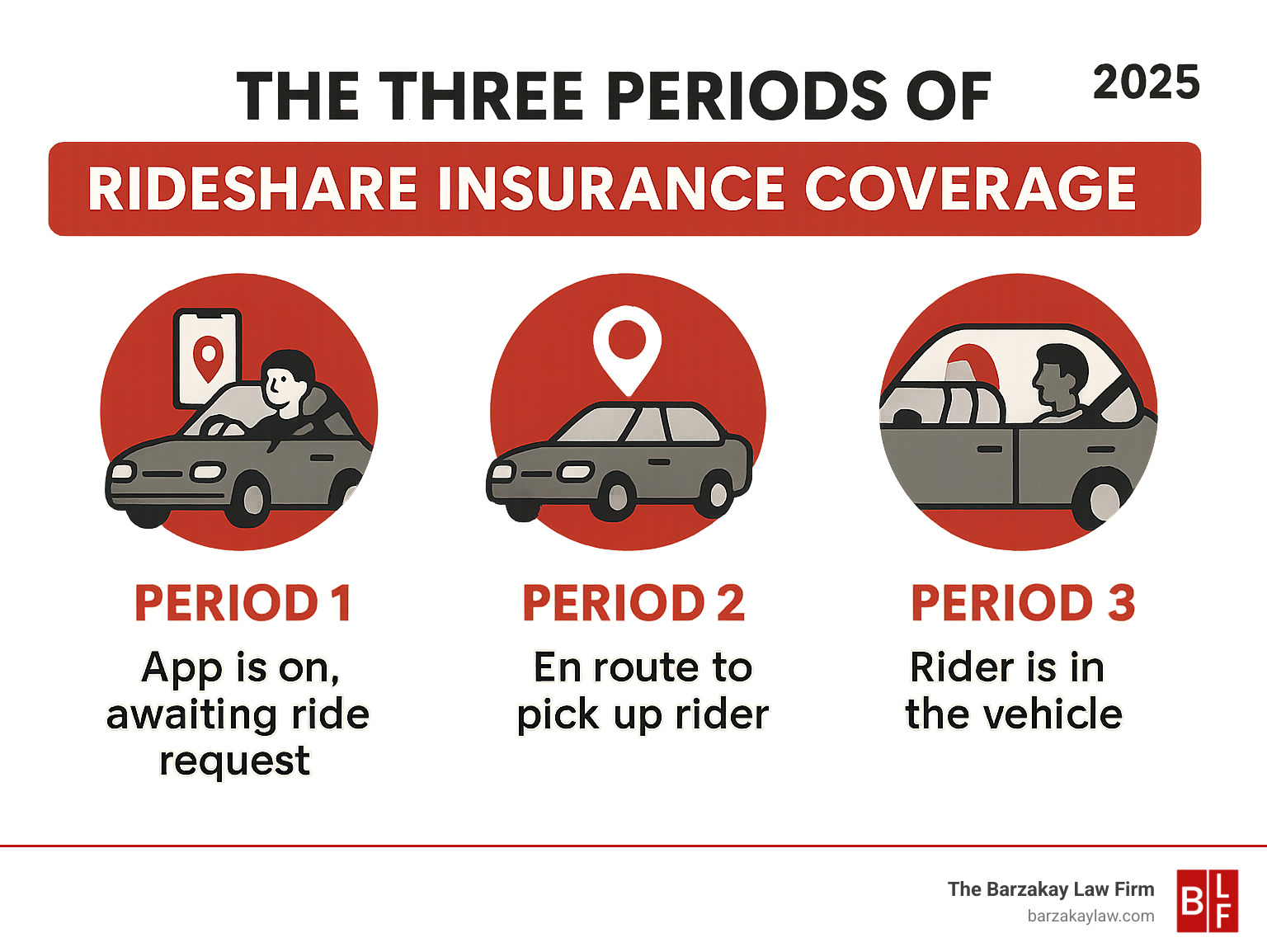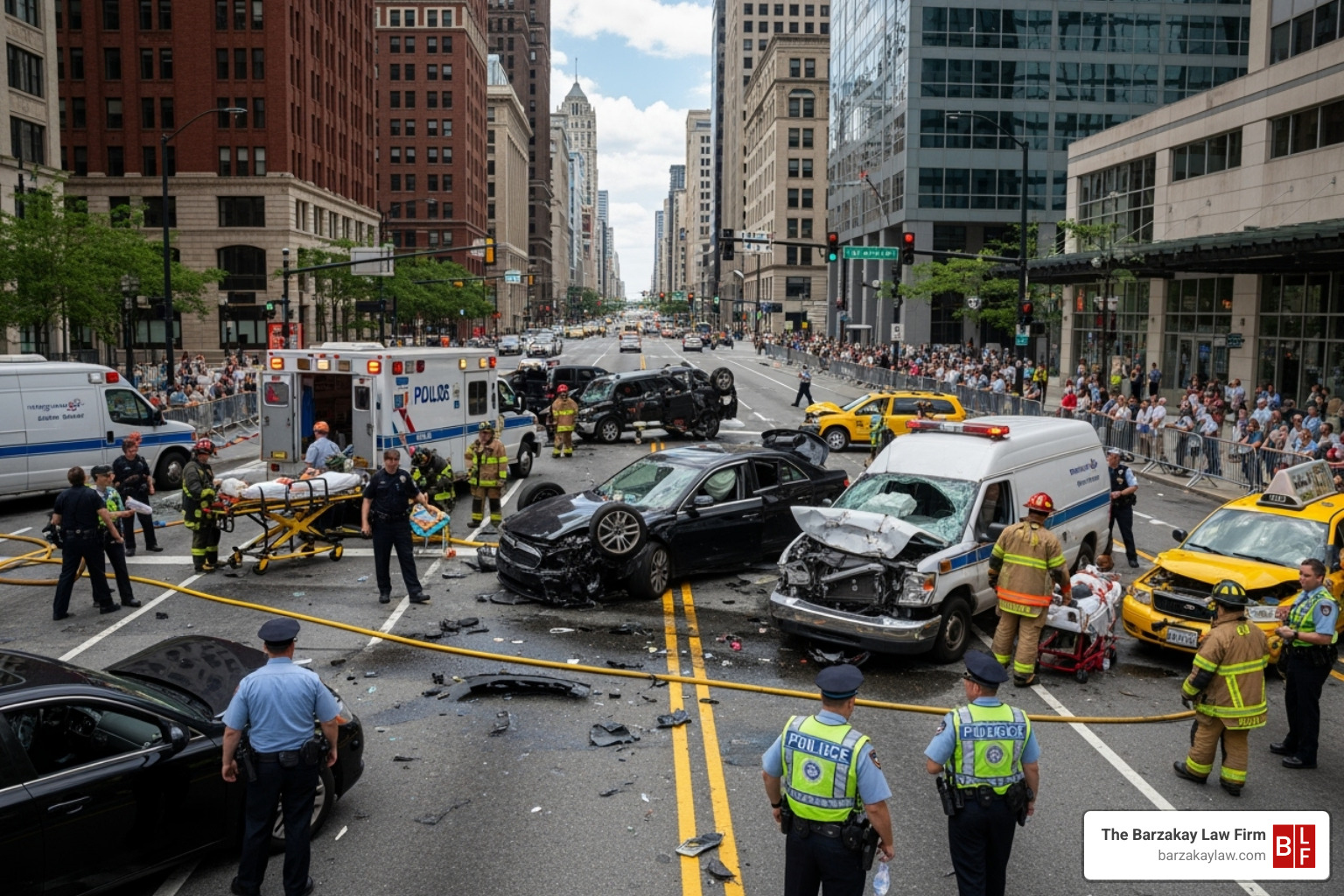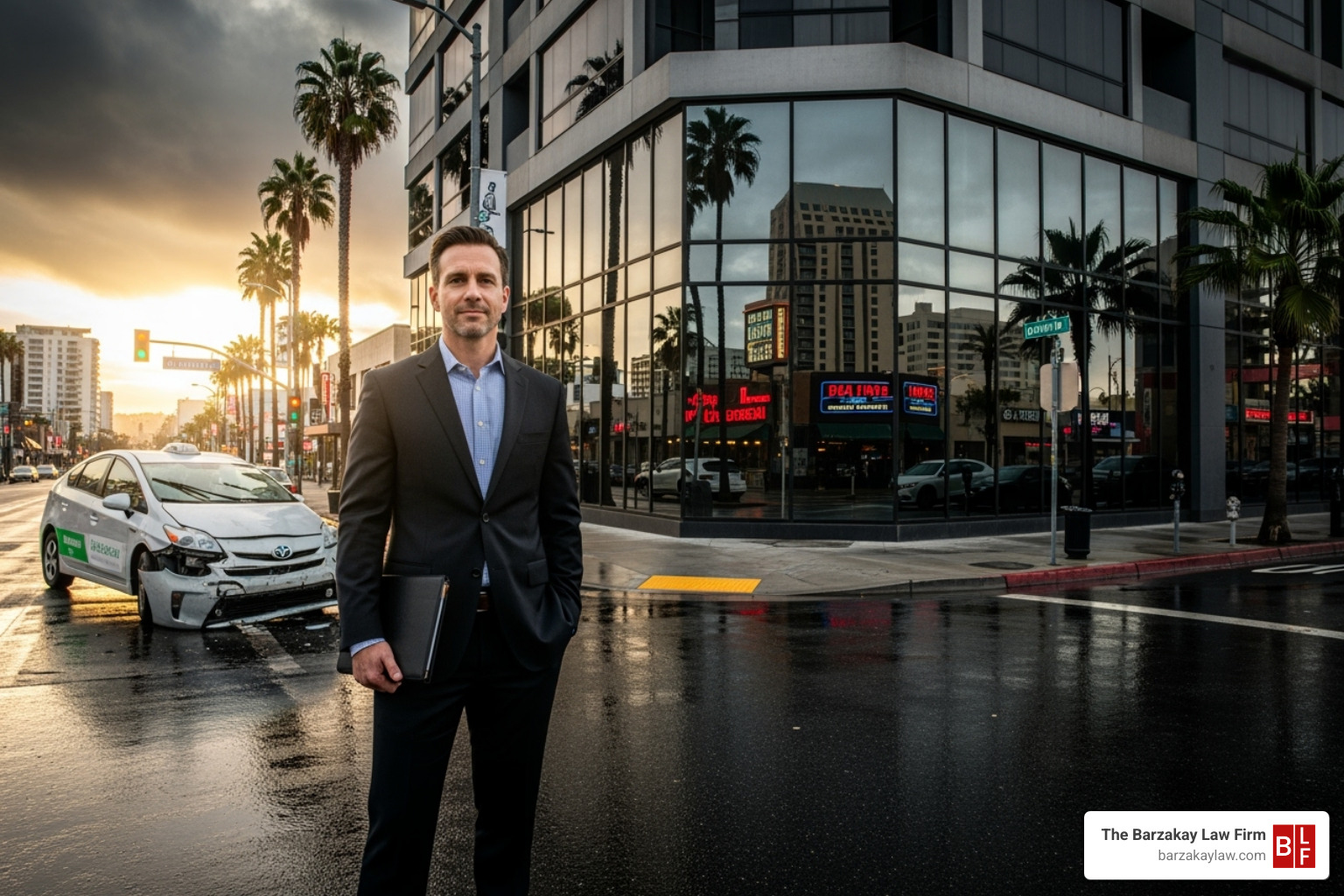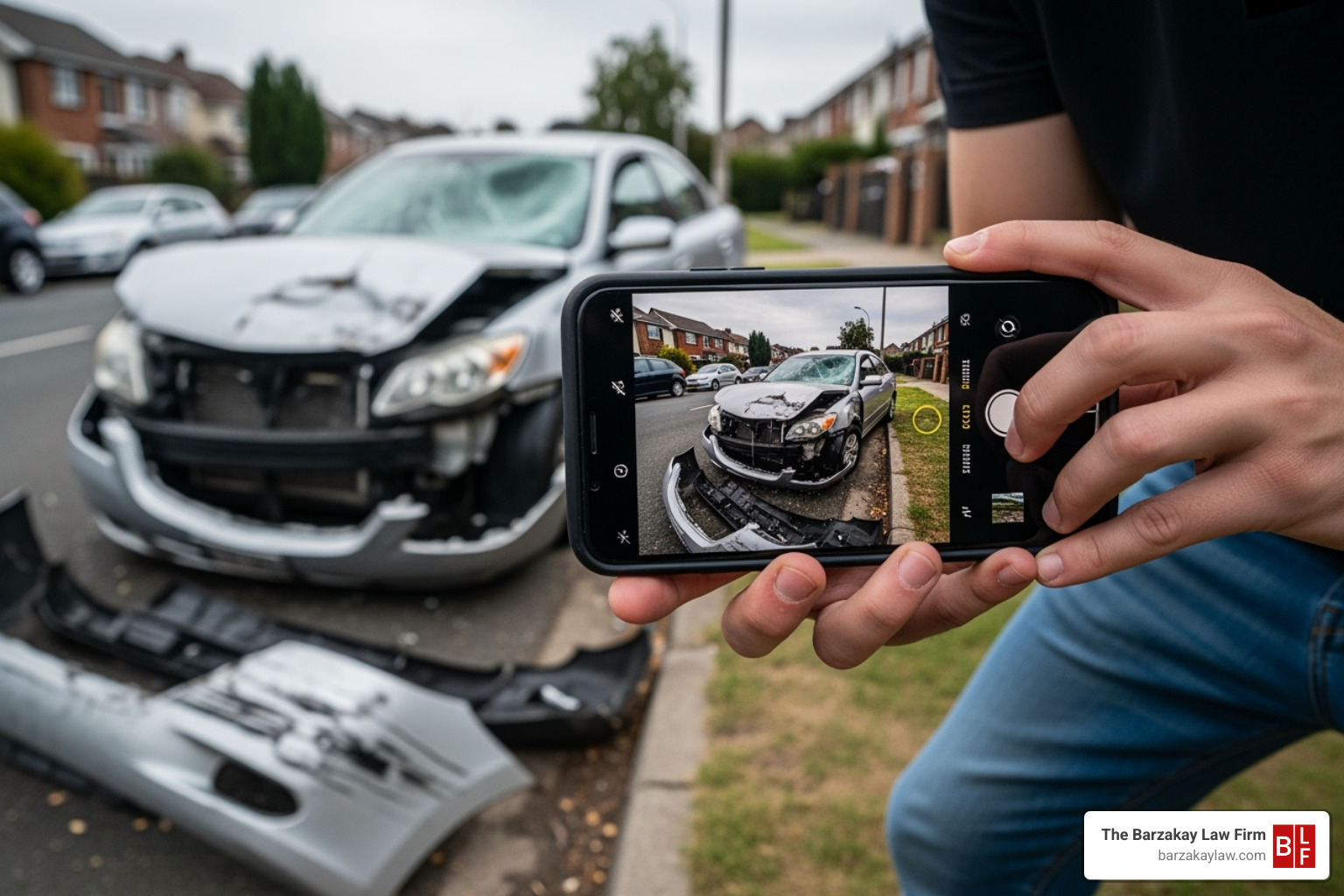The Rise of Rideshare and South Florida’s Accident Landscape
If you’ve been in a collision involving a rideshare vehicle, securing fair compensation can be a tough fight. The process is often more complicated than a standard car crash claim. This guide will help you understand your legal options if you need a south florida rideshare accident lawyer.
Rideshare accident claims in the Miami area are complex for several reasons. Drivers are typically independent contractors, not employees, which affects who is held responsible. Multiple insurance policies can apply, including the driver’s personal insurance, the rideshare company’s policy, and possibly a third party’s. This makes determining fault and which policy should pay a significant challenge. Furthermore, Florida has specific laws governing rideshare companies that add another layer of complexity.
Ridesharing services like Uber and Lyft have transformed urban travel, offering a convenient alternative to driving. However, this convenience has a downside. Studies have linked these app-based services to a 3% increase in traffic fatalities nationwide since their introduction.
In South Florida, rideshare vehicles are a common sight, increasing the potential for accidents. The Florida Highway Patrol (FHP) reports hundreds of crashes involving rideshare cars in Miami-Dade County annually. Many of these accidents occur in busy spots like South Beach, Downtown Miami, Wynwood, and near Miami International Airport.
Accidents often spike during rush hour, with a significant increase in incidents between 4-7 PM. Driver fatigue is also a major factor, with a notable rise in fatigue-related crashes during late-night hours (midnight to 4 AM) as drivers push to complete more trips.

Why Rideshare Accident Claims in South Florida Are So Complex

Imagine a standard car accident: two drivers, two insurance companies. Now, picture that same accident with an Uber or Lyft. Suddenly, the situation involves more than just two parties. When you need a south florida rideshare accident lawyer, it’s often because the case has become a puzzle.
Unlike typical car crashes, rideshare accidents involve independent contractor drivers working for large corporations with their own legal teams. You could be facing the driver’s personal insurance, the rideshare company’s commercial policy, and other drivers’ insurance carriers. The legal waters are further muddied by how these companies operate. By classifying drivers as independent contractors, companies attempt to distance themselves from liability when accidents occur. This creates what lawyers call vicarious liability issues—determining who is ultimately responsible. You can learn more about vicarious liability and how it affects these cases.
Florida law adds another layer of complexity with specific rules for rideshare insurance coverage. These rules vary depending on the driver’s status at the time of the crash: waiting for a request, driving to a pickup, or transporting a passenger. Each scenario triggers different insurance coverage levels. For more information about how these factors affect vehicle accidents, the legal landscape is constantly evolving.
The Driver’s Status: Independent Contractor vs. Employee
When you call an Uber, you might assume the driver is an employee. Legally, however, that driver is operating as an independent business. They use their own car, set their own hours, and can work for multiple rideshare companies.
This driver classification is significant. If drivers were employees, you could potentially sue Uber or Lyft directly for their driver’s negligence. Because they are independent contractors, the companies have created a legal buffer. While there have been legal challenges nationwide regarding classifying independent contractors, Florida law generally upholds their contractor status.
This means suing the company directly is difficult. Your claim is often directed at the individual driver and the applicable insurance coverage. The impact on liability is substantial, shifting the focus from a large corporation to a driver who may have minimal personal coverage.
Navigating Multiple Insurance Companies
Dealing with one insurance company can be complicated; a rideshare accident may involve three or four, each aiming to minimize its payout.
First is the driver’s personal policy. Most personal auto policies exclude coverage for commercial activities. If the driver was logged into the app, their insurer might deny the claim.
Next is the rideshare company’s policy, which varies based on the driver’s activity. These policies offer substantial coverage but are designed to protect the company.
If another driver was at fault, their insurance company also gets involved. You may find yourself dealing with multiple insurance adjusters with conflicting interests. One may blame the rideshare driver, another may blame you, and a third might downplay the accident’s severity. Insurance companies know this system is confusing and may offer a quick, low settlement. Having a representative who understands this maze can be critical to receiving fair compensation.
Understanding Liability and Insurance in a South Florida Rideshare Crash

When you’re injured in a rideshare accident, determining who pays for your damages can be confusing. The central question is: who was negligent? Under Florida law, everyone has a duty to use reasonable care to avoid harming others. When someone breaches that duty, they are responsible for the resulting losses.
In rideshare accidents, who pays depends on the driver’s status when the crash occurred. Was the app off? Was the driver waiting for a ride request, or were they actively transporting a passenger? A driver’s insurance coverage changes throughout their shift, and understanding which period applies at the time of your accident is crucial for your claim.
The timing of the crash determines which insurance policy is active and the amount of coverage available. This system can seem complicated, but understanding the framework clarifies why having a south florida rideshare accident lawyer familiar with these rules is so valuable.
| Coverage Period | Driver’s Status | Uber Coverage | Lyft Coverage |
|---|---|---|---|
| Period 0 | App Off / Not Logged In | Driver’s personal insurance applies. Rideshare company provides no coverage. | Driver’s personal insurance applies. Rideshare company provides no coverage. |
| Period 1 | App On / Awaiting a Ride Request | Up to $50,000 bodily injury per person, $100,000 per accident for bodily injury, and $25,000 for property damage. | Up to $50,000 bodily injury per person, $100,000 per accident for bodily injury, and $30,000 for property damage. |
| Period 2 & 3 | En Route to Pick Up Passenger / During Trip with Passenger | Up to $1,000,000 in third-party liability coverage. Uninsured/Underinsured Motorist (UM/UIM) coverage matching liability. | Up to $1,000,000 in third-party liability coverage. Uninsured/Underinsured Motorist (UM/UIM) coverage matching liability. |
How Uber and Lyft’s Insurance Policies Work
Let’s break down these coverage periods. When a driver’s app is on but they have not yet accepted a ride (Period 1), both companies provide contingent liability coverage. During this waiting period, Uber covers up to $50,000 per person and $100,000 per accident for bodily injuries, plus $25,000 for property damage. Lyft offers similar coverage with a slightly higher property damage limit of $30,000. This is important because most personal auto policies deny coverage for commercial driving.
Once a driver accepts a ride or has a passenger, the $1 million liability policy from both companies takes effect. This significant increase in coverage is designed to handle serious accidents. Both companies also carry uninsured/underinsured motorist coverage that matches their liability limits during active trips. This is vital if an at-fault driver has little or no insurance. You can find details on Uber’s insurance policy and Lyft’s insurance policy on their websites.
Note the property damage deductibles: Lyft has a $2,500 deductible, and Uber’s is $1,000. This amount is deducted from a property damage settlement.
Who Can Be Held Liable?
In a rideshare accident investigation, we examine all potentially responsible parties.
- The rideshare driver is often the primary focus if their negligence caused the crash.
- The rideshare company may be held accountable in certain situations, such as negligent hiring, though their insurance policies are the more common target.
- Another driver could be partially or fully at fault, especially in multi-car accidents common in busy South Florida.
- Vehicle manufacturers can be liable if a defect like faulty brakes contributed to the crash.
- Government entities may bear some responsibility if poor road design or broken traffic signals were a factor.
Identifying every contributing party is key to maximizing your potential compensation.
What if the At-Fault Driver is Uninsured or Underinsured?
It’s a frustrating scenario: the at-fault driver has no insurance or not enough to cover your damages. If you were a passenger in a rideshare vehicle during an active trip, the company’s $1 million uninsured/underinsured motorist (UM/UIM) policy is designed to protect you. This allows you to seek compensation from Uber or Lyft’s policy.
For drivers of other vehicles hit by an uninsured driver, your own policy’s UM/UIM coverage is your first line of defense. It’s wise to review your personal policy to ensure you have adequate coverage, as Florida’s minimum requirements may not be enough for serious injuries. Understanding these backup coverage options is critical when facing significant medical expenses.
Common Causes and High-Risk Areas for Rideshare Accidents in South Florida
Rideshare driving in South Florida creates unique pressures that can lead to dangerous situations. Drivers are often juggling their phone for requests, navigating unfamiliar areas, and working long hours to maximize earnings. This pressure can lead to accidents across Miami-Dade, Broward, and Palm Beach counties.
Top Causes of Rideshare Crashes
Distracted driving is a primary cause of rideshare accidents. Drivers must use their phones for their job—accepting rides, following GPS, and communicating with passengers—all while navigating busy streets. The National Highway Traffic Safety Administration has shown how distracted driving significantly impairs a driver’s abilities.
Drowsy driving is another serious issue. To earn more, drivers often work late nights and early mornings. A fatigued driver can have reflexes as impaired as someone under the influence.
Driving under the influence (DUI) also occurs. Unlike taxi companies with regular screenings, rideshare drivers are not typically subject to random testing, creating a potential risk.
Speeding and reckless driving can result from the financial pressure to complete trips quickly. This may lead to aggressive lane changes and running yellow lights.
Unfamiliarity with South Florida’s roads adds another risk. Drivers relying heavily on GPS may make sudden maneuvers, which is especially dangerous in complex areas like the Dolphin Expressway or around major airports.
Unsafe pickup/drop-off locations contribute to many crashes. In busy areas like South Beach or Wynwood, drivers might stop abruptly in traffic lanes, creating hazards for others.
South Florida Accident Hotspots
Certain areas in South Florida are natural hotspots for rideshare incidents.
South Beach is a high-risk zone with its heavy pedestrian traffic, busy nightlife, and constant rideshare activity. Drivers often struggle with congestion and finding safe places to stop.
Downtown Miami presents challenges with its complex intersections, heavy traffic, and a constant mix of tourists and locals requiring rides.
Fort Lauderdale Beach and its surrounding areas can be tricky. Narrow streets packed with visitors create conditions where drivers may make unsafe stops in traffic.
Miami International Airport (MIA) and Fort Lauderdale-Hollywood International Airport (FLL) are also hazardous. The flow of drivers unfamiliar with airport traffic patterns, while also managing their app, creates a risky environment.
Accident timing reveals important patterns. Rush hour sees a spike in crashes, but late nights are particularly dangerous. Fatigue-related accidents jump significantly between midnight and 4 AM as drivers continue working to catch profitable fares. If you need a south florida rideshare accident lawyer, understanding these common factors can help build a stronger case.
Your Rights and Next Steps After a South Florida Rideshare Accident

In the moments after a rideshare accident, the steps you take can significantly impact your physical and financial recovery. Your safety is the top priority. Call 911 if anyone is injured and seek a medical evaluation, even if you feel fine. Some injuries, like concussions or whiplash, may not be immediately apparent, and medical records are vital for a claim.
Ensure a police report is filed. If you can do so safely, take photos of the vehicles, license plates, damage, and the overall scene. Take a screenshot of your rideshare app, as it contains important trip details that establish the driver’s status.
Exchange information with everyone involved, but avoid admitting fault. Insurance companies can use apologetic statements against you. Before speaking with any insurance adjusters, consider contacting a south florida rideshare accident lawyer. An insurer’s goal is to minimize their payout, not protect your interests.
What Compensation Can You Recover?
After an accident caused by someone else’s negligence, Florida law allows you to seek compensation for your damages.
- Medical Bills: This covers everything from the emergency room to ongoing physical therapy and future medical needs.
- Lost Wages: If your injuries prevent you from working, you can recover lost income and compensation for any reduction in your future earning capacity.
- Pain and Suffering: This compensates for the physical pain and emotional distress caused by the accident.
- Property Damage: This covers the cost to repair or replace your vehicle or other damaged property.
- Loss of Enjoyment of Life: If the accident prevents you from participating in hobbies and activities you once enjoyed, you may be compensated for this loss.
For more information, you can review our page on personal injury claims.
Florida’s Statute of Limitations
There is a time limit for filing a personal injury lawsuit in Florida. For most negligence claims, the statute of limitations is now two years from the date of the accident for incidents occurring after March 24, 2023, per Florida Statutes § 95.11. This deadline can be shorter in some cases, such as those involving a government entity. Acting quickly is important, as evidence can be lost and memories can fade over time.
Can I Pursue a Claim if I Was Assaulted by a Rideshare Driver?
If you were assaulted by a rideshare driver, you have the right to seek justice. First and foremost, call the police to file a criminal report. You can also pursue a separate civil claim for assault and battery to obtain compensation for your physical and emotional trauma.
While rideshare companies classify their drivers as independent contractors, they may still be held liable, particularly if they failed to conduct a proper background check. Companies like Lyft prohibit such conduct, but that doesn’t absolve them of all responsibility. These cases are sensitive and involve both criminal and civil legal systems. Having a representative who understands both aspects can be invaluable.
Frequently Asked Questions about a South Florida Rideshare Accident Lawyer
When you’re dealing with the aftermath of a rideshare accident, questions naturally pile up. Here, we address some of the most common inquiries we receive.
Why is it important to hire a South Florida rideshare accident lawyer?
Hiring a south florida rideshare accident lawyer is often essential for a fair outcome. These cases are notoriously complex. You’re not just dealing with a simple car crash; you’re facing confusing insurance policies and the legal nuances of the “independent contractor” model. A lawyer who understands these details can manage the process for you.
We can help you steer insurance policies, determine which one applies, and ensure your claim is filed correctly. We also work to calculate all damages—not just current medical bills, but also future costs, lost income, and the emotional toll. Insurance companies are skilled negotiators who aim to pay as little as possible. We are here to fight for fair compensation and ensure your voice is heard. This provides you with peace of mind to focus on your recovery while we handle the legal work.
For more reasons why legal representation is crucial, you can read our insights on 12 Reasons Why a Personal Injury Attorney is Needed After an Auto Accident.
What are my rights if I was a passenger in a rideshare vehicle involved in an accident?
As a passenger in a rideshare accident, you are generally in a strong position to receive compensation. Since you weren’t driving, you are almost never considered at fault. Your primary right is to seek compensation for your injuries and losses. If the driver was on an active trip, the rideshare company’s $1,000,000 liability policy is typically available to cover your damages.
If the at-fault driver was uninsured or underinsured, the rideshare company’s $1,000,000 uninsured/underinsured motorist (UM/UIM) coverage would likely apply to protect you. We can guide you through this process, identifying all liable parties and exploring all avenues for compensation. You can check out our general advice on How to Handle a Car Accident Claim as a Passenger.
Can I directly sue Uber or Lyft after an accident in South Florida?
This is a common and tricky question. Directly suing Uber or Lyft for their driver’s actions is challenging because of the “independent contractor” defense. The companies argue that since drivers are not employees, they are not directly responsible for their conduct.
However, this doesn’t mean you can’t access their resources. You can almost always make a claim against their substantial $1,000,000 insurance policy if the driver was on an active trip. So, while you may not be suing the corporation directly for the driver’s negligence, you are pursuing a claim against their insurance policy.
In rare cases, a direct lawsuit against the company might be possible, for instance, if the company was negligent in its own right (e.g., failing to conduct a proper background check). Landmark court cases, like a notable settlement in a San Francisco case, have explored this issue. We examine every detail to determine the most effective path to get you the compensation you need.
Conclusion
We’ve covered a lot of ground, from complex insurance policies to determining fault. Rideshare accidents in South Florida are in a league of their own. They are far from straightforward, and managing a claim can be overwhelming, especially while you are recovering from injuries.
Having a dedicated team on your side can make a significant difference. Knowing your rights, understanding the legal complexities, and taking prompt, decisive action are crucial steps toward securing the compensation you deserve.
At The Barzakay Law Firm, we understand the unique challenges these cases present. Our team is passionate about fighting for fair compensation for those injured by someone else’s negligence. Whether you’re dealing with an accident in Hollywood, Miami, Boca Raton, or Fort Lauderdale, our approach is consistent: putting your recovery first.
We believe everyone deserves a fair chance at justice, which is why we operate on a contingency fee basis. This means we don’t get paid unless we win your case. If you’ve been in a rideshare accident, understanding your legal options is the first step toward healing. Don’t go it alone. Learn more about how we handle rideshare accident cases.


